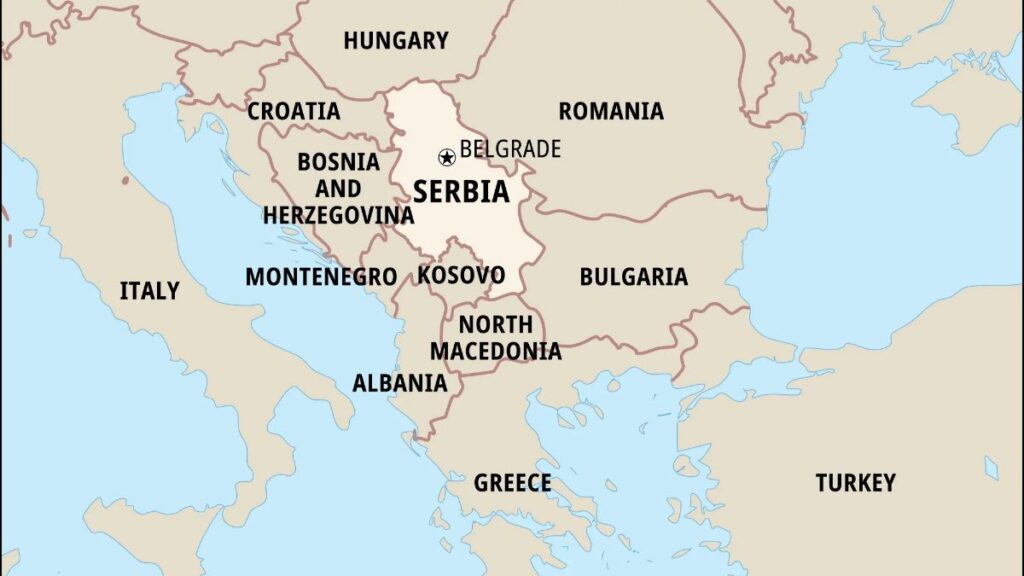
FROM THE DESK OF STEVE LANCASTER, UK DIRECTOR – April 24
EGGS IN SERBIA – AND THE POWER OF GOD’S WORD!
It’s all about eggs – or is it!? Over this Easter period it’s estimated that 90 million chocolate eggs will be eaten in the UK – and if you laid them all side by side, they would stretch from the UK to Sri Lanka! Take the humble creme egg, of which 200 million of them are made every year; if you were to place a year’s supply one on top of the other, they’d reach higher than Everest! Even more startling is the fact that consumers will spend a total of £415 million on chocolate eggs this easter! Just think what the world of Bible translation could do with that money!!
Like Christmas, an event that originated as a solely Christian observation, Easter has evolved over the years to include a whole host of secular customs, both old and new. For those who don’t celebrate the real reason for Easter, it’s simply an event that involves the coming of spring, two bank holidays, copious amounts of chocolate eggs, hot-cross buns, and the adorable bunny rabbit that is somehow capable of delivering basketfuls of eggs! So, what is it with the egg theme, and how has it become part of our Easter celebrations?
Some suggest that Easter has its origins as an early pagan Anglo-Saxon festival that celebrated the goddess ‘Eastre’ – who was linked to the arrival of spring, and the resurrection of nature after the winter months. Eggs were eaten at this festival and were buried in the ground to ‘encourage’ fertility. The story goes that Christian missionaries took the opportunity to weave the gospel message into this custom, referring to the eggs as ‘resurrection eggs’, symbolising the new life of a risen Jesus, bursting out of an enclosed tomb.
An alternative explanation also goes back hundreds of years, but has a more practical reason. When the rules for fasting during Lent were much stricter than they are today, Christians weren’t supposed to eat any animal product, including cheese, milk, and eggs. During Lent they would hard-boil their poultry eggs, store them up, and then decorate them so they could be distributed at the end of Lent (Easter) to mark the end of fasting. In 1873, a certain chocolate manufacturer called J S Fry took things a step further and produced the first hollow chocolate egg…and Mr Cadbury took full advantage!

Eggs in Serbia! In the country of Serbia, one of the pagan Easter traditions is to decorate eggs, with the first one always painted red. That egg, called the čuvarkuća, is kept in the home for the entire year until the next Easter comes along. The superstitious belief associated with this practise is that the egg protects the home from all harm; čuvar means guard, and kuća means home. TWFTW is currently working in Serbia and is involved in a Bible translation project amongst the Romani people who speak the Chergash language – a Vlax dialect that is spoken mostly in Serbia.
A team of translators are currently 69% of the way through the New Testament, and portions are already being used. Two women at a recent Chergash Bible study group were able to read Acts 19 in their own language, which refers to people in Ephesus who were challenged about their superstitious pagan beliefs. V24 tells us that: “a silversmith named Demetrius made silver shrines of Artemis, which brought in no little business for the craftsmen”. The goddess Artemis (or Diana) was associated with fertility and was reproduced in miniature statue-form for people to take home and put on their mantle pieces as a good luck charm.
As the two Serbian women read this passage in their heart language, the words came alive, and they were convicted to give up their pagan practice of čuvarkuća in their homes. They realised, as Christians, that it was wrong to put their trust in lifeless amulets (in this case decorated eggs), but that they should put their faith in the finished work of Christ on the cross. Praise God for the life-changing impact of His Word, and for the fact that the Bible enables people to grow and mature in their faith. Praise God also, for the message of the cross and the empty tomb; for the sacrifice that Jesus made, and for all that it means to us as we celebrate another Easter.

| Just in case you’re still wondering what the world of Bible translation could do with that £415 million – here’s the answer! The average cost of translating the New Testament is £158,000, and there are at least 3,500 languages in the world today that don’t have a New Testament. If all of the UK ‘easter egg’ money from this year was used for translation purposes, 2630 languages could have a New Testament to read by 2029!! |
“Out & About” Diary Dates for UK Director:
2nd April: Trans World Radio Interview 2pm
12th – 14th: Tirana, Albania, to visit TWFTW translation team
25th April: UK Board Meeting, Bedford
Praise & Prayer Points:
- Eastern DRC Congo: Praise God that an exegete team managed to get to Kongolo to work on the Hemba translation. However, there is still a lot of turmoil and fighting between government forces and various rebel groups. Please pray for peace, and for the protection of our teams.
- SE Asia: Please pray for our teams in ‘MY’ – for their safety and protection, amidst the turmoil that the country is in.
- Albania: Praise God that a new board and an administrator have been appointed for the translation team there. The translation team is actually ahead of schedule, even though they’re only in their first year. The UK office has recently been able to provide the budget shortfall for this ongoing project. Please pray for this team, and also for the UK Director who plans to visit the team in Tirana, 12th-14th April.
- UK: The UK support base meets for its first board meeting of the year on 25th April. We are still looking for two new trustees to join the board, preferably with accounting or legal experience. If you know of anyone who might be suitable (and interested!) please let us know (admin-uk@twftw.org). Thank you for your prayers.
